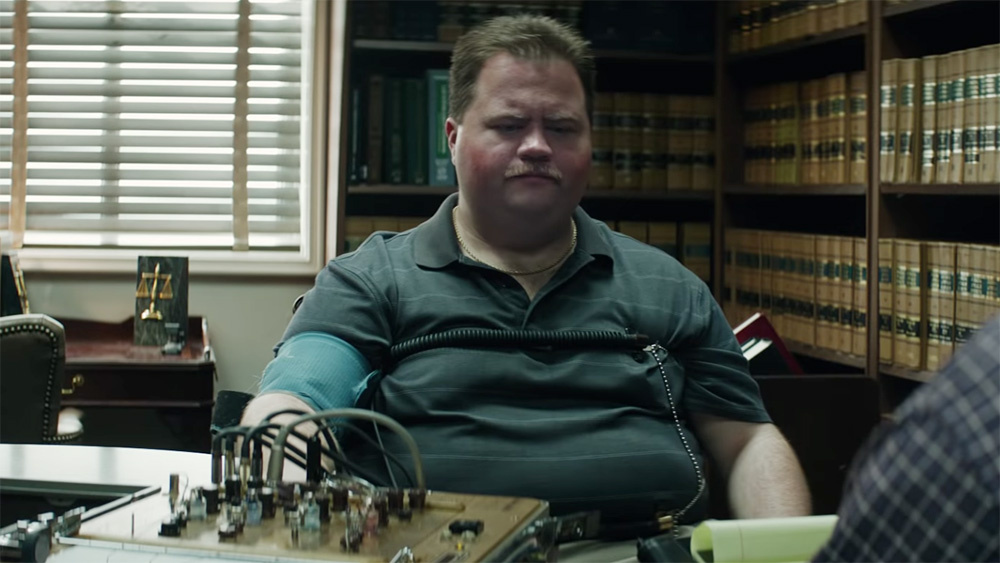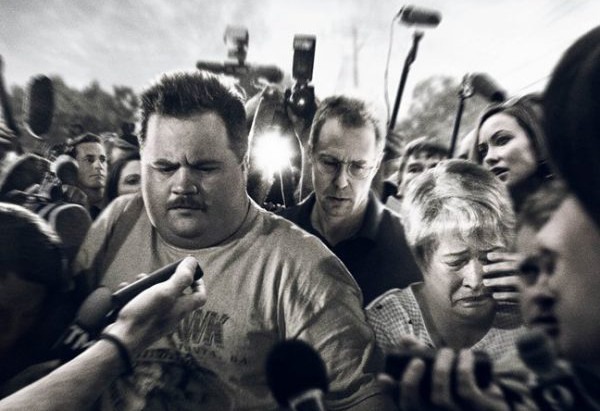The film opens in an office. An overweight mail clerk — Richard (Paul Walter Hauser) — awkwardly approaches the lawyer (Sam Rockwell) working in his cubicle. He informs (more like mumbles) Rockwell’s Watson Bryant that he’s not only refilled his drawer with stationery, he also has placed a bunch of Snickers bars in his top drawer. He says that he knows Watson likes the caramel candy because he paid attention to what’s in his trash can and noticed the wrappers. The words that leave Richard’s mouth are kind, but the air that surrounds him is unsettling. He comes as a stalker and a creep who rummages through people’s personal belongings. I immediately wondered if I would feel the same way if Jewell was a sexy secretary whose long blonde hair is tied in a nice little ponytail. Probably not. The human subconscious can be a total d*ck, our perspectives often times prejudiced. But it’s this judgemental prism of ours that make the first half of Richard Jewell a fascinating watch. Jewell is one of those guys who comes off as pathetic. He’s a 30-something-year-old who has been fired from a number of jobs because he always tries too hard to the point of crossing the line. One time he pulled a car over on the freeway for speeding. He was just a security guard. There’s also the time where he worked as a campus security guard and tackled a student for having a beer in his room. He believes it deep in his gut that he’s an esteemed member of law enforcement. In reality, he’s Paul Blart who thinks he’s John McClane. But it’s this Captain America-like mindset mixed with his sharp eye and crazy attention to detail that saved thousands of lives. Clint Eastwood directs the scenes at the Olympics like a thriller. It plays out over two days and keeps you at the edge of your seat. When Richard Jewell discovers an odd package, nobody believes him at first. But he’s persistent and pushes the higher ranking officers on duty to take notice. The bomb goes off, but not before Jewell and the officers form a perimeter and instruct civilians to move away from the scene. Some people still die, but a lot more lived thanks to his noble efforts. At first, he’s treated as a hero only for everything to take a sharp turn for the sour when the FBI makes him their prime suspect and the media turns him into the bastard son of Satan himself.
The FBI has no hard evidence or even limp evidence for that matter. They just believe he fits a “lone bomber” profile — someone who plants a bomb and then pretends to be the hero. Not so funny thing is, you start to wonder too. It doesn’t help that his only friend is an ex-junkie who looks like he hasn’t eaten in days. It doesn’t help that he lives with his mom. It doesn’t help that he has less charisma than an empty sardine can. And it most certainly doesn’t help that he has with him a book on OJ Simpson. Screenwriter Billy Ray includes a scene early in the film where Richard and his friend practise shooting at a gun range. I love Eastwood’s lingering closeup of the target in which Richard hits multiple bullseyes. You take this scene combined with the information presented by the FBI and the media and your mind connects the dots. You start to wrestle with yourself. “There’s no evidence!” “But look at the man! He’s probably a serial killer! The kind who beheads people but not before asking them to run through the forest as he hunts them down like effing Ramsay Bolton in Game of Thrones.” “Well, what if people accuse you of sexually assaulting a middle-aged woman and then look through your laptop and discover that you have an affinity for cougar porn. Does that mean you did it?!” “But… but!” It’s during these moments, where the focus is squarely on the textured protagonist who causes a conflict within you, where Richard Jewell truly shines. You also feel for Richard’s mom Bobi (an excellent Kathy Bates) who’s helpless in her efforts to protect her odd boy. When she delivers the speech towards the end, you feel her voice piercing your soul.
It’s a shame that these nuances and shades aren’t extended to the villains. It’s a shame that we even have “villains.” The FBI agents (led by Jon Hamm’s Special Agent Shaw) come off as lazy bastards who are more than happy to ruin someone’s life just because. I’ve just started watching the TV series, Mad Men. In it the Jon Hamm cheats on his wife frequently. But just as you’re about to hate him, he charms you with his magnetism and vulnerabilities. He’s also exceptional at his job and has a way with words that will make you pop like Anne Hathaway in The Princess Diaries, before you go back to hating him all over again. It’s a constant struggle. Here, Shaw is just a moron. There’s not a single scene that helps you understand the circumstances that led him to target Richard Jewell. He’s one dimensional and not for a second do you see where he’s coming from. So the flavour of the film changes. You stop wrestling with yourself and just root against Jon Hamm. The film becomes less interesting and more cliche, so much so that a part of me actually hoped that at the end of it, Richard Jewell would light up a cigarette and say “the greatest trick the devil…” Worse than Special Agent Shaw is journalist Kathy Scruggs (Olivia Wilde). Wilde is given nothing to work with and her performance is cartoonish. Most of the time she’s so over the top, she might as well be named Rita Skeeter. In a hilarious scene, she sleeps with an FBI agent for a story. Spoiler alert: It’s not supposed to be funny. Early in the film, she wishes out loud that the bomber be someone interesting. Later in the film, she weeps when Richard’s mom delivers a heartbreaking speech. I rolled my eyes. These problems prevent Richard Jewell from being great. But it doesn’t stop it from being good. It’s still a fascinating story made engaging by great writing of the protagonists and even better performances by Hauser and Bates. It just could’ve been much better especially given the man behind the camera. Richard Jewell opens in Malaysian cinemas on 20 February 2020.

